

Journalism.
The Power of Filming Cops: Nearly Half of All NYPD Brutality Claims are Now Being Proven by Video. New York, NY — In the last few years, smartphones have become cheaper and more plentiful.
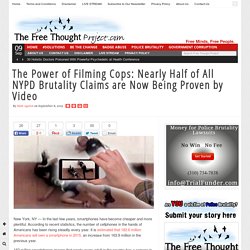
According to recent statistics, the number of cellphones in the hands of Americans has been rising steadily every year. It is estimated that 182.6 million Americans will own a smartphone in 2015, an increase from 163.9 million in the previous year. 182 million smartphones means that nearly every adult in the country has a camera in their pocket. Since the increase in smartphones, there has also been an increase in police brutality videos. This increase in videos led to the question of whether brutality is on the rise or merely that the frequency of filming the instances has risen.
While the answer to this question is up for debate, one thing is certain — the number of police brutality allegations being substantiated by video has increased. This increase is an 11% jump from 2014 alone. The death was even ruled a homicide due to “compression of neck, chest and positioning during restraint by police.” New App from ACLU to Help People Who Record Police. Muckraker. McClure's (cover, January 1901) published many early muckraker articles.
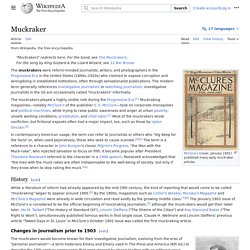
The term muckraker was used in the Progressive Era to characterize reform-minded American journalists who attacked established institutions and leaders as corrupt. They typically had large audiences in some popular magazines. In the US, the modern term is investigative journalism — it has different and more pejorative connotations in British English — and investigative journalists in the USA today are often informally called 'muckrakers'. Muckraking magazines—notably McClure's of the publisher S. S. The muckrakers played a highly visible role during the Progressive Era period, 1890s–1920s.[2] In contemporary American use, the term describes either a journalist who writes in the adversarial or alternative tradition, or a non-journalist whose purpose in publication is to advocate reform and change.[3] Investigative journalists view the muckrakers as early influences and a continuation of watchdog journalism. The Jungle. The Jungle is a 1906 novel written by the American journalist and novelist Upton Sinclair (1878–1968).[1] Sinclair wrote the novel to portray the harsh conditions and exploited lives of immigrants in the United States in Chicago and similar industrialized cities.[2] However, most readers were more concerned with his exposure of health violations and unsanitary practices in the American meatpacking industry during the early 20th century, based on an investigation he did for a socialist newspaper.
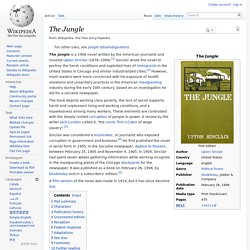
The book depicts working class poverty, the lack of social supports, harsh and unpleasant living and working conditions, and a hopelessness among many workers. These elements are contrasted with the deeply rooted corruption of people in power. A review by the writer Jack London called it, "the Uncle Tom's Cabin of wage slavery".[3] Plot summary[edit] The main character in the book is Jurgis Rudkus, a Lithuanian immigrant trying to make ends meet in Chicago. Characters[edit] Nellie Bly. Early years[edit] Nellie Bly working in a factory producing boxes At birth she was named Elizabeth Jane Cochran.
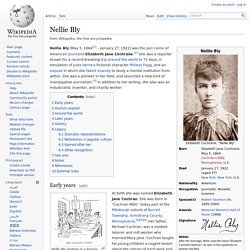
She was born in "Cochran Mills", today part of the Pittsburgh suburb of Burrell Township, Armstrong County, Pennsylvania.[4][5][6] Her father, Michael Cochran, was a modest laborer and mill worker who married Mary Jane. Cochran taught his young children a cogent lesson about the virtues of hard work and determination, buying the local mill and most of the land surrounding his family farmhouse. As a young girl Elizabeth often was called "Pinky" because she so frequently wore the color. In 1880, Cochrane and her family moved to Pittsburgh. As a writer, Bly focused her early work for the Dispatch on the plight of working women, writing a series of investigative articles on women who were factory workers, but editorial pressure pushed her to the so-called "women's pages" to cover fashion, society, and gardening, the usual role for women journalists of the day.
Asylum exposé[edit] Pentagon Papers. A CIA map of dissident activities in Indochina published as part of the Pentagon papers The Pentagon Papers, officially titled United States – Vietnam Relations, 1945–1967: A Study Prepared by the Department of Defense, is a United States Department of Defense history of the United States' political-military involvement in Vietnam from 1945 to 1967.
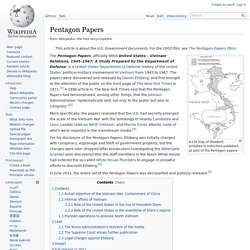
The papers were discovered and released by Daniel Ellsberg, and first brought to the attention of the public on the front page of The New York Times in 1971.[1] A 1996 article in The New York Times said that the Pentagon Papers had demonstrated, among other things, that the Johnson Administration "systematically lied, not only to the public but also to Congress. "[2]